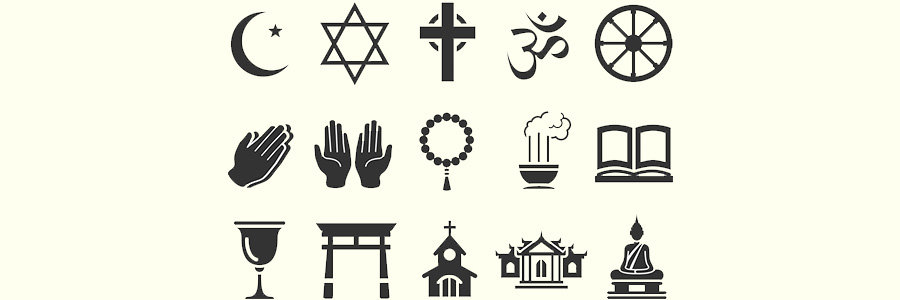Interfaith Dating

Dating someone of a different faith-background has become more and more common, especially among those living in cities and large suburbs. Interfaith dating is not necessarily a new phenomenon, but it has become increasingly common and, therefore, more normalized. Thanks to online and mobile dating, daters have access to all different types of potential matches. While faith may be important to many daters, dating someone from a different background may not always be a deal breaker.
When getting to know someone of a different faith background of your own, a great place to start is to ask questions and be curious. Whether you are very familiar with their faith or have never heard of it, it is always important to come across as being open-minded. Asking people questions about themselves, especially their faith and culture, shows not only that you are interested, but it also shows that you aren’t making assumptions. Even if you have many friends of the same faith-background as your date, it is still important to not assume that their upbringings and values are the same as your friends.
Before jumping into a relationship with someone with a different faith than your own, it is important to first ask yourself how important religion is to you when choosing a partner. Dating people from other faiths can open your eyes to other cultures and upbringings as well as either solidify your own values or show you where you are flexible or willing to negotiate. Before going on a date with someone from another faith as your own, I would ask yourself if you could see yourself being in a longterm relationship with someone of a different faith. If the answer is no, it may be helpful to quit while you’re ahead and not date someone of a different faith to not lead them on. If your answer is maybe, then I would continue to date people of different backgrounds; however, it will be important to be clear about your own faith and its importance in your own life.
Questions to be asking yourself about your own religion and faith are which aspects of it are a hard boundary and which aspects have room for compromise. Are you more connected to your faith for religious reasons, cultural reasons, or both? What fears do you have about dating someone from a different faith? Can you still practice your faith in the relationship openly? Do I want my partner to practice with me? Do I want my partner to learn about my religion or also participate in it with me during special holidays and traditions? Is it more important to my family than it is to me that I marry within the faith? Once you have a clear understanding of which aspects of your faith are important to you and will have a hard boundary as opposed to which aspects have room for compromise, then it will be important to share this with people you are dating so they have an understanding of what your expectations are in a partnership.
Other questions to ask yourself to gain more clarity is to ask what your faith or religion has meant to you thus far. How has your religious (or non-religious) upbringing impacted you as an adult? For example, if you grew up going to Catholic schools and colleges, you may not have thought about whether or not you would want your children to do the same. Did you grow up attending religious camps or being involved in youth groups? Reflecting on your experiences growing up may help you gain clarity on how important it is to pass down these experiences to your children in the future. While you may not be thinking about potential children with a person you just started dating, it is still important to keep these values in mind.
If you are having difficulty navigating an interfaith relationship or dating people of other religious backgrounds, it may be helpful for you to not only gain a deeper understanding of how important of a role religion plays in your own life, but to also gain tools to communicate more openly without making assumptions or holding judgment. If you are looking to take a deeper look at your faith and values and want to learn better communication tools for dating, contact Symmetry Counseling to set up an appointment with one of our therapists for individual or couple therapy.

Recent Posts
From Self-Care to Stronger Relationships: How Mental Health Shapes Love, Parenting, and Connection
Love, family, and emotional well-being are deeply connected. Yet, in many cases, people invest their time, money, and energy in life’s big moments: the wedding, the birth of a child, or even the pursuit of love. They do so without…
How to Create Meaningful Connections and Protect Your Emotional Space
At social gatherings or in everyday life, many people feel pressure to connect, communicate, and be perceived as confident. Take a minute to think about what kind of person comes to mind when you think of someone who is great…
Understanding Envy and Emotions in the Digital Age: How to Reconnect with Yourself
Envy is one of humanity’s oldest emotions, yet today it shows up in new ways. The constant connection offered by smartphones and social media makes it easy to compare ourselves to others on a daily basis. This exposure can stir…
Do You Need Help?

Not what you were looking for?
